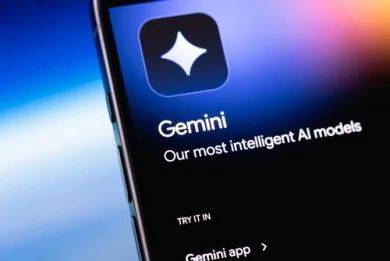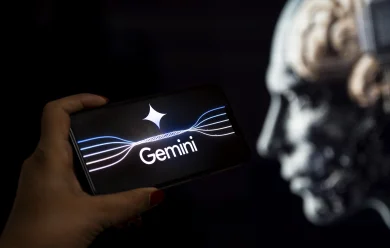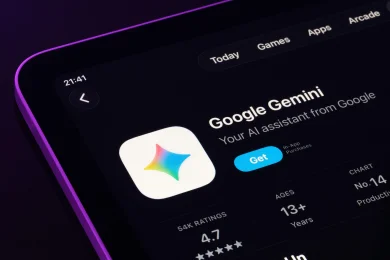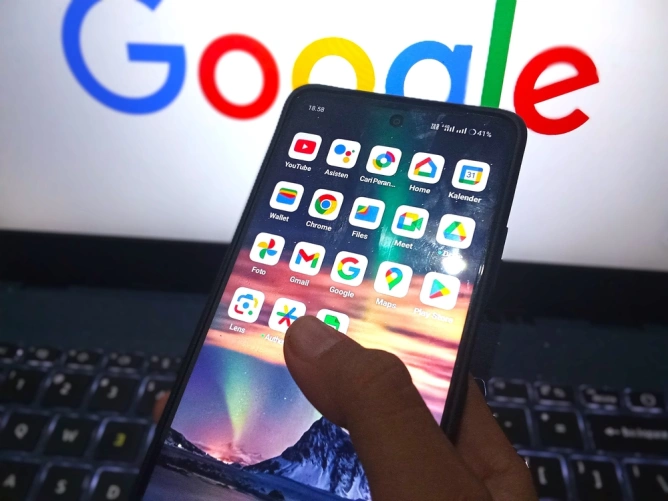.webp)
Google says that a typical AI prompt consumes only 5 drops of water
Running a single prompt in Google's AI chatbot Gemini consumes about the same energy as watching 9 seconds of television, according to a new technical study.
Google claims that a text prompt through Gemini uses approximately 0.24 watt-hours (Wh) of energy, according to a post on the company's blog. The energy emitted through the use of AI is equivalent to about 0.03 grams of carbon dioxide.
The AI chatbot also consumes 0.26 milliliters of water, which is about five drops of water for each prompt.
Dex is an AI-based camera device that helps children learn foreign languages
Three parents — Reni Cao, Xiao Zhang, and Susan Rosenthal — were concerned about the time their children spent in front of screens, so they left their jobs in technology to create a product that encourages children to interact with the real world and, at the same time, learn a new language. Their movement has paid off, with the company recently managing to raise $4.8 million in funding.
The new gadget launched is called Dex and resembles a high-tech magnifying glass: it has a camera lens on one side and a touchscreen on the other. When children take pictures of objects with this device, the AI uses visual recognition to identify the object and translate the word into the selected language. The device also includes interactive storytelling lessons and games.
OpenAI warns about SPVs and other "unauthorized" investments
In a new blog post, OpenAI warns against "unauthorized opportunities to indirectly invest in OpenAI through various means," including through special purpose vehicles known as SPVs.
"We urge you to be cautious if you are contacted by a firm claiming to have access to OpenAI, including through the sale of SPV interests related to OpenAI stock," the company writes. The post acknowledges that "any offer of OpenAI stock is problematic," but emphasizes that some firms may try to "circumvent our transfer restrictions."
"If that is the case, the sale will not be recognized and will have no economic value for you," adds OpenAI.
Google makes video editing easier from Drive with a new Vids shortcut button
Google announced on Friday that it is improving the video editing experience from Drive through a new shortcut button for Vids, its AI video creation tool.
The new feature allows Workspace users to start editing a video with Vids directly from the Google Drive interface. Now, when previewing a clip in Drive, users will see an "Open" button in the upper right corner, which opens the video in the Vids application. Vids will automatically launch the file and allow for additional edits, such as trimming the clip or adding music and text.
Extremely sensitive patient data using medical cannabis exposed through an unsecured database
Cybersecurity researcher Jeremiah Fowler discovered and reported to Website Planet an unencrypted and passwordless database that contained 957,434 records. The database belongs to an organization in Ohio that helps individuals obtain doctor-approved medical cannabis cards.
The exposed data included personal information (PII), driver's licenses, medical records, documents with social security numbers, and other potentially sensitive internal information.
Google expands AI Mode globally and adds new agentic features
Google is launching a global expansion of the AI Mode feature, which allows users to ask complex questions and continue conversations to delve deeper into topics directly in Search, the company announced on Thursday. Additionally, Google is adding new, personalized, and "agentic" capabilities.
As part of the expansion, Google is bringing AI Mode to 180 new countries, in English. Until now, it was only available in the US, UK, and India. Google plans to add more languages and regions soon.
Regarding the new agentic features, users can now use AI Mode to find restaurant reservations, and in the future, they will be able to find appointments for local services or tickets for events.
Spotify announces price increases alongside the introduction of new services
Spotify will raise prices as it invests in new features and aims to reach 1 billion users, the Financial Times reported on Sunday, citing Alex Norström, co-president and Chief Business Officer of the streaming platform.
According to FT, these price increases will be accompanied by new services and features planned, Norström said in an interview.
Apple in talks to use Google's Gemini AI for a reinvented Siri, Bloomberg News reports
Apple is in preliminary discussions to use Google's Gemini AI with a view to reinventing the voice assistant Siri, Bloomberg News reported on Friday, citing people familiar with the situation.
Alphabet shares rose by 3.7%, and Apple shares by 1.6%, both extending gains in after-hours trading following the news.
According to the report, Apple recently approached Google to develop a customized AI model that will underpin a redesigned version of Siri, scheduled for next year.
Meta signs a cloud contract with Google worth over $10 billion, a source says
Google has signed a six-year agreement for cloud computing services with Meta Platforms, worth over $10 billion, a source familiar with the situation told Reuters. This is the second major contract for Google, following a recent one with OpenAI.
Under the agreement, Meta will use servers, storage, networking, and other services provided by Google Cloud, the source, who wished to remain anonymous due to the confidential nature of the discussions, specified.
FTC chief warns tech companies not to weaken data protection to comply with EU and UK laws
The Federal Trade Commission (FTC) has warned American technology companies that complying with European Union and United Kingdom rules regarding online content and encryption could violate U.S. law.
In a letter sent to executives, FTC Chair Andrew Ferguson said that restricting access to content for American users solely to comply with external legal requirements could constitute a violation of Section 5 of the FTC Act, which prohibits unfair or deceptive trade practices.
Ferguson cited the EU Digital Services Act and the UK Online Safety Act as examples, as well as reports regarding attempts by the British to access encrypted data from iCloud, measures that could put companies at risk from a legal perspective in the U.S.
Google brings improved Gemini features to the new Pixel Buds
As with last year, Wednesday's Made by Google event showcased numerous Gemini features, including AI tools for photography and editing on the Pixel 10 series, as well as improvements for the Pixel Watch 4. It was expected that Google would also reveal Gemini features for its latest earbuds — the redesigned Pixel Buds 2a and Pixel Buds Pro 2.
Among the most important new features presented: Pixel Buds 2a receive active noise cancellation and an AI feature that reduces background noise, while Pixel Buds Pro 2 will have a major update allowing users to accept or reject calls and messages with simple gestures, such as nodding affirmatively or negatively.
Meta launches AI translations for creators globally, starting with English and Spanish
Meta announced on Tuesday the launch of an AI-based voice translation feature, available to all users on Facebook and Instagram globally.
The new feature, available in all regions where Meta AI exists, allows creators to translate content into other languages, thus reaching a wider audience.
The feature was first announced at last year's Meta Connect conference, when the company said it would test automatic translations of creators' voices in Reels on Facebook and Instagram.
Meta specifies that AI translations will use the original voice and tone of the creator, so that the result sounds as authentic as possible in the new language.
Chinese startup DeepSeek launches an improved AI model compatible with local chips
The Chinese artificial intelligence startup DeepSeek has revealed that China will soon have locally produced "next generation" chips designed to support its AI models, simultaneously announcing an update for one of its large language models.
In a public comment posted on its official WeChat account, DeepSeek stated that its new model V3.1, with "UE8M0 FP8" precision format, is adapted for the new generation chips built in China, which are set to be launched soon.
FP8, or "floating point 8 bits," is a data processing format that can increase computational efficiency for training and running large deep learning models.
Windows 11 tests AI file searching in the Copilot app
Microsoft is testing an update for Windows 11 that allows you to search for files and images using AI directly from the Copilot app. The test is now rolling out to Windows Insiders on Copilot Plus PCs and allows users to use more descriptive language when searching.
Currently, you can use the Copilot app to search for a file by name, last opened date, or document type. The new update takes things further and allows you to describe what you are looking for, for example: "find the file with the chicken tostada recipe." Microsoft has already launched the AI-based Windows search feature on Copilot Plus PCs earlier this year.
Meta will launch Hypernova smart glasses with display and bracelet at Connect next month
Meta plans to use next month's annual Connect conference to take a bigger step into the smart glasses space, including launching the first consumer glasses with a built-in display, CNBC has learned.
This is one of two new devices that Meta intends to showcase at the event, according to sources close to the company. Meta will also launch its first smart bracelet, which will allow users to control the glasses through hand gestures, the sources added.
Apple Health+ is expected to launch next year with two new features
In its Power On newsletter, Mark Gurman stated that Apple Health+ will include an AI-based health coach that offers nutrition plans and medical suggestions.
Initially, Gurman expected this coaching feature to be included in iOS 19.4 (now known as iOS 26.4), but later clarified that it will not be available before iOS 27. The service will be integrated into the Health app on iPhone and iPad.
The cost of this service has not been mentioned.
Now you can talk to Google Photos to edit images
At the Made by Google event on Wednesday, the company announced new features for Google Photos that will allow users to ask the app to edit their photos. The functionality will first be launched on Pixel 10 devices in the U.S., and users will be able to describe what changes they want either by voice or text.
Google is also adding support for the C2PA Content Credentials standard in Google Photos. The Pixel 10 phones will be the first to adopt this standard, which aims to increase transparency regarding how images are created and whether AI was involved. On Pixel devices, C2PA is integrated directly into the Camera app and in any photos taken with it, even when AI is not used.
Apple's September event: iPhone 17, ultra-thin iPhone Air, and what else to expect
Apple's big fall presentation is scheduled for September 9, and this year's lineup could mark the beginning of a bold new chapter for the iPhone. Alongside the iPhone 17 family, Apple is expected to unveil updates for the Apple Watch and AirPods, and numerous rumors and leaks are already shaping what is to come.
Meta signs an agreement with Midjourney to enhance AI visuals in future products
Meta has entered into a licensing agreement with the generative AI startup Midjourney, bringing their advanced "aesthetic" technology into the models and future products of the social giant.
The collaboration, announced on Friday by Alexandr Wang, Chief AI Officer of Meta, will connect the research teams of both companies. The move underscores Meta's strategy to elevate the visual quality of its AI systems, in the context of increasing competition with rivals like OpenAI and Google.
Microsoft's AI chief warns against studies on "AI consciousness"
Artificial intelligence systems can today generate text, images, and even videos so realistic that sometimes people are fooled into thinking they are interacting with a real person. But does that mean they are conscious? Not at all — ChatGPT does not "suffer in silence" when it helps you with tax statements.
However, researchers from labs like Anthropic and OpenAI are exploring whether, one day, advanced AI could develop subjective experiences — and if so, what rights should be granted to it. The idea, often referred to as "AI welfare," is a controversial one.










